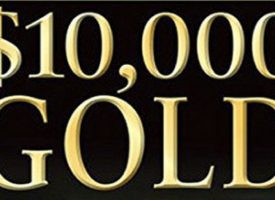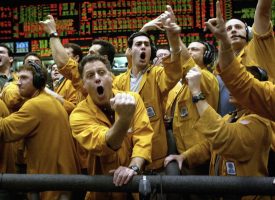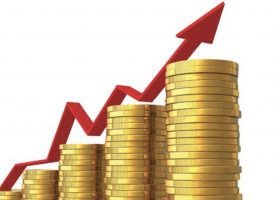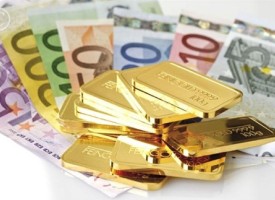With a wild start to the 2016, today a legend in the business sent King World News a powerful piece about the $6 trillion wipeout in global markets and a world on the edge of chaos.
 A World On The Edge Of Chaos
A World On The Edge Of Chaos
By John Ing, Maison Placements
January 22 (King World News) – There’s a whiff of the 1930s in the air. Global markets had their worst start ever. But the market is confusing coincidence with causation. In a déjà vu moment there are concerns that oil’s collapse is America’s next sub-prime disaster – after all, the big banks have healthy loan and derivative exposure. The other concern is about China’s stock market meltdown that after a 150 percent gain, somehow will trigger a global collapse. While pundits cite these factors in the panic, oil and China have been going down for months so the declines are nothing new or surprising…
To hear which company Eric Sprott, James Turk and George Soros invested in that is advancing the digital payments revolution and makes it possible for you to spend gold with a prepaid-card globally click on the logo:
The problem we believe is part economic. The main factor is that the US economy, once thought to be most powerful, is collapsing under the weight of trillions of printed dollars. The market is adjusting to a “new norm” and finally catching up to reality. America’s policymakers are grappling with the exit from quantitative easing (QE) and a “return to normal”.
At home and abroad, investors have lost faith in the markets and fear that central banks have lost their grip on the economic levers, wasting the seven years not with reform but senseless money printing. During that period, the bull market was supported by free money and the belief that money had value. However, the collapse in oil, markets and currencies indicates that the problem is not in China, emerging markets nor Europe. It’s in the U.S.
Politicization of Policy
Long ago, the world was based on good intentions. As such, every policy initiative has become more politicized, prompting policy makers to intervene in the economy –after all the polls can’t be wrong. Monetary and fiscal policies have become politicized whilst fundamental reforms like tax reform or, in Canada, a single regulator are left aside.
Quantitative easing simply sowed the seeds of a worse financial problem than QE was to fix. Sooner or later investors will learn that this so-called money illusion and ideology can’t save the economy from its fundamental problems and that less intervention is needed to solve the very problems elected officials were trying to solve.
 With the ink barely dry on the historic Paris Climate Accord, the grandiose and inspirational announcements from our politicians saw nearly 200 countries signing on. Few recall that after the Kyoto Accord, US shale technology financed of course by Wall Street’s derivative gang allowed America to become an exporter of oil. As new technology replaced the old technology, Paris simply replaced new targets, in place of the old targets. Again our politicians took the easy way out. And sure Paris was a tiny step, but like closing tax loopholes and eliminating waste, it is not so painless.
With the ink barely dry on the historic Paris Climate Accord, the grandiose and inspirational announcements from our politicians saw nearly 200 countries signing on. Few recall that after the Kyoto Accord, US shale technology financed of course by Wall Street’s derivative gang allowed America to become an exporter of oil. As new technology replaced the old technology, Paris simply replaced new targets, in place of the old targets. Again our politicians took the easy way out. And sure Paris was a tiny step, but like closing tax loopholes and eliminating waste, it is not so painless.
The first rate increase in almost 10 years is another example of the politicization of monetary policy. After saving the Eurozone and Wall Street in 2008, with rounds and rounds of quantitative easing and zero interest rates, the consequences of the world central banks’ noble intentions are only just emerging against the backdrop of global market losses. Credit spreads have widened, sovereign defaults are on the rise and global markets have become addicted to the stimulus provided by zero rates and quantitative easing.
Good intentions aside, we believe our politicians won’t be able to evade the consequences of their politicized decisions. Politicians it seems are heading in different directions. In the Thirties, the failure of politicians resulted in an upsurge of support for the nationalistic right because democracy was seen as failing. And today, our democratic leaders seem to flail in the wind with old ideas. When politicians admit they can’t solve our problems and politicize economic policy, they invite the extreme as seen in France, the UK and the United States.
Plenty of problems are in evidence. There are spreading signs that Black Swans are everywhere, a consequence of this politicized era, from Britain going to the polls on Brexit this year, to America’s multi-billion presidential election, to China’s revamp of its economy, to Europe’s stagflation, to the tide of refugees created by a sinking Middle East. All are signs of shifting tectonic plates in the global economy exacerbated by attempts to shift government led stimulus (QE) to private-sector led growth that only heightens investor risk.
Geopolitical Causation is Running the Other Way
This year we believe we are in the transitional phase of the geopolitical games of chance where rifts are exposed. Oil has dropped 18 percent since the start of the year to 13 year lows as Saudi Arabia racks up $100 billion deficits. OPEC’s de facto leader has introduced spending cuts to offset the impact of low oil prices. The 13 nation group while controlling more than a third of the world’s oil supplies over-produces in pursuit of a long term strategy to recapture market share. The consequences are disastrous.
Today, Brazil, the leader of the emerging economies, must borrow just to pay interest while its public debt is at the third highest since records began. Standard & Poor’s cut Brazil’s sovereign credit rating to junk. Once a country that symbolized human rights and the fifth largest gold producer in the world, South Africa’s political uncertainty continues following the dismissal of another finance minister, only four days after President Zuma dumped another one sending the rand to record lows.
And in Europe, all are weak under spending pressures and the growing refugee problem. Growth remains a major problem, particularly when so much debt overhangs the EU. Russia faces the prospect of a recession hit by collapsing oil prices, western sanctions and a sinking ruble. Puerto Rico, a ward of the United States, recently defaulted on debt payments on a debt load of $72 billion but the default has not yet had a ripple effect on Wall Street. As a legacy of 2008, debt keeps piling up proving equally consequential. Geopolitical games have become the new reality.
 Lessons From the Arab Spring
Lessons From the Arab Spring
The onslaught of Arab Spring brought much rhetoric of a new beginning, but five years later the consequences are only now being realized, with the Arab world worse off than in 2011. The wealthy Arab Gulf states are under pressure and sectarian divisions have deepened between Persian Iran and the Arab states. America sidestepped a geopolitical contest in the Middle East, by siding with Iran which led to the lifting of sanctions amidst a growing sectarian dispute between Iran and Saudi Arabia. The lifting of sanctions though allows Iran to increase oil production sending prices to 13 year lows, hurting even US shale producers.
Saudi Arabia is a majority Sunni country and its dilemma is that they bought sectarian peace through generous public spending and welfare payments which are threatened by the collapse in oil prices. Even so, the execution of the highest ranking Shiite cleric reignited the long standing Sunni/Shiite rivalry but the problem is beyond sectarian differences. The rivalry is more about the domination of the Middle East, its trade routes and oil. For now, at least further pressure on oil prices is expected as Saudis overproduce to put pressure on Iran. However, the power vacuum created by Washington’s retreat exacerbated the rivalry, drawing in the world powers into a new and dangerous phase. Unfortunately, America having recently surrendered to the Russians a 2,400-kilometer air corridor from the Baltic Sea to the Black Sea, are just spectators here.
America’s politicians too must face the consequences of their good intentions and rhetoric past. Moscow, Tehran, Beijing and Riyadh have forced investors to face deteriorating choices. Needed of course are financial reform, long term investment and structural transformation but the US economy has become so addicted to credit bubbles that it has become debt-ridden, rooted not in economics, but in politics and ideology. What ballasts the US monetary system is debt, and it is still growing. Debt to GDP is 100 percent and the system is so debt-clogged that the 0.25 percent rate increase caused a major correction.
The Americans have become addicted to zero interest rates and quantitative easing which pushed up asset prices artificially, inflated valuations and depressed growth. And now the markets fear a return to normal which will cause even bigger defaults than 2008. Today, mammoth oil and gas defaults threaten Wall Street’s banks and private equity players in a repeat of 2008, aggravated again by derivatives. Unless these problems are addressed, geopolitical risk premiums can only grow. Gold will be a good thing to have.

Great Circuit Breaker of China
There is much concern over China’s large cap CSI 300 index sell-off, which triggered circuit breakers for the second time in a week sending financial shock waves around the world. Overlooked was that Chinese stocks are trading at 60 times forward earnings and after a 150 percent move fueled by leveraged retail speculators, everyone headed for the exits. China’s capital markets are thin and nascent lacking even the equivalent US Plunge Protection Team. Gambling investors simply discovered that trees don’t grow to the sky.
Noteworthy is that the stock markets play a relatively small role in China’s GDP and are not an indicator of China’s health. Little Chinese wealth is actually stored in shares, particularly when compared to property and unlike western wealth management, they do not have RRSPs or 401 Ks. Noteworthy is that China’s stock market is still higher than last summer’s low. Nonetheless though, the sell-off in stocks spurred demand for a haven and gold stocks soared as equities swooned. What will happen when the Chinese stock market rallies and North American markets continue to swoon. Whom else can they blame?
Although China’s slowdown has been two years in the making, it will still grow at close to 7 percent. We believe concerns about the slowdown are much exaggerated. First, Alibaba’s “Single’s Day” sales reached $14.3 billion, smashing records and an indication of a vibrant and growing middle class. Auto sales were also at a record.
Second, China’s infrastructure rollout is just beginning with 30 new regional airports being built and $120 billion of railway lines linking major centers. Indeed, China’s Silk Road initiative is a “Made in China” Marshall Plan. To be sure, what is slowing down is the ridiculous boom time expansion of expensive western capacity that was supposed to satisfy Chinese commodity demand growing to the sky. Much of that capacity was to be based where? The West. Third, China is the biggest beneficiary of the collapse in commodity prices, receiving a bonus windfall.
Fourth, China has shifted more to a domestic demand driven economy and less from an investment and manufacturing model. America’s economy is geared more towards debt-fueled consumption with the consumer accounting for almost 70 percent of economic activity. Ironically what the United States desperately needs are more investment and less consumption.
On the other hand, China’s growth hinges on all four drivers and that transition is confusing to the West. The West forgets that in less than three decades, China has grown from an impoverished agrarian country into a manufacturing powerhouse largely on infrastructure growth becoming one of the major superpowers in the world. That turnaround has come while its population exploded to 1.4 billion and changes were needed to lift the living standards of those people. Of course, debts have piled up but those debts are largely owed to the government, not unlike the United States, where the Federal Reserve’s balance sheet was used to finance America’s growth over the past seven years.
Furthermore, President Xi Jinping’s policies and intentions are a conservative effort to eliminate self-serving corruption and reduce the huge bureaucracy – a supply-side approach. Here, there seems to be a true effort combining private and public works projects. Finally, devaluation jitters are intensifying. The renminbi sank eight percent to its lowest level since 2010, aiding the world’s biggest exporter. Although, China spent more than $100 billion in the summer to stabilize its currency, the lower renminbi will help out exporters who were badly hurt when China’s currency, pegged to the dollar, jumped 60 percent as the super-strong greenback made exports particularly expensive with neighboring “Asian Tigers”, South Korea, Singapore and Taiwan.
Nonetheless, the renminbi’s sharp decline has caused angst among investors because the “stealth” competitive devaluation joins Switzerland, Brazil, Mexico, Sweden and soon Saudi Arabia. Of equal concern is what China does with its capital. Last year they ran down their trillion dollar foreign exchange reserves, selling US Treasuries. China still has $3.4 trillion of foreign exchange, but financing America’s profligacy by buying Treasuries has become passé.
 Gold – The Antidote To Our Problems
Gold – The Antidote To Our Problems
Despite dropping 10 percent in US dollar terms last year, gold denominated in ten other currencies (eg ruble, SA rand, Brazilian real) has increased. In Canada and Australia, gold was up. In Russia, gold is at a record. Since 2010, central banks have become net buyers of gold, close to a fifty year high. These central banks also have repatriated their gold reserves from Fed and UK bank vaults. Historically and today, gold is still a currency. Russian and Chinese central banks are buying physical gold as a hedge and diversification move against a dollar debasement. The world’s largest bank ICBC recently bought a 1,500 tonnes storage facility in London to store Chinese gold. Do the banks know something we don’t know?
In the past few years, the main reason for gold’s drop was a super-strong dollar which acted as a refuge for the trillions created by a global easing monetary policy. However, gold is an alternative investment for central bankers and a hedge in a time of competitive devaluation. We believe faced with the consequences of rounds and rounds of quantitative easing, the avalanche of dollars will push the dollar’s value down this year.
 China Buys Staggering 85 Percent Of West’s Annual Gold Production
China Buys Staggering 85 Percent Of West’s Annual Gold Production
On the other hand, Chinese gold demand approaching 50 tonnes a month has taken up nearly 85 percent of Western gold production last year. We believe the Chinese are following the age old prescription of purchasing tonnes of gold to protect themselves against a depreciating renminbi. History shows that gold always retains its value. And with the world’s assets largely denominated in a fiat paper currency, our view is that the US dollar’s days of acting as haven are limited by, ironically, the upswing in interest rates and the growing concern among central banks about its value, particularly during an unpredictable election year.
In November, the Americans may elect another inflationist Democrat socialist or the Donald. That will be good for gold, but bad for the dollar. Consequently, we believe that gold bottomed last year and expect a run to $1,170 an ounce in the near term but importantly see a resumption of the bull market which will see gold topping $2,000 per ounce.
***ALSO JUST RELEASED: Financial Superstars Warn, Despite Bounce, Global Stock Market Carnage To Continue CLICK HERE.
© 2015 by King World News®. All Rights Reserved. This material may not be published, broadcast, rewritten, or redistributed. However, linking directly to the articles is permitted and encouraged.









